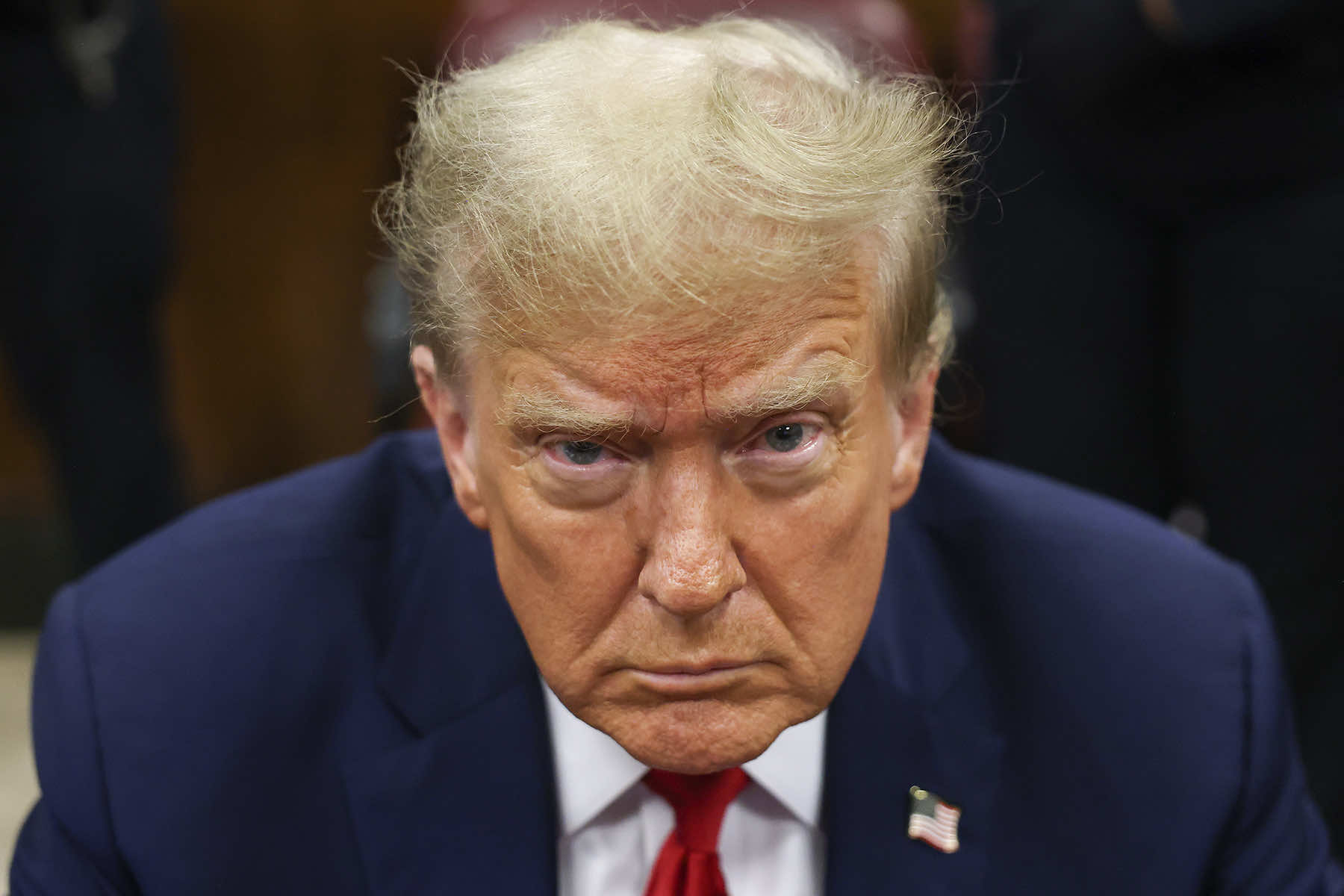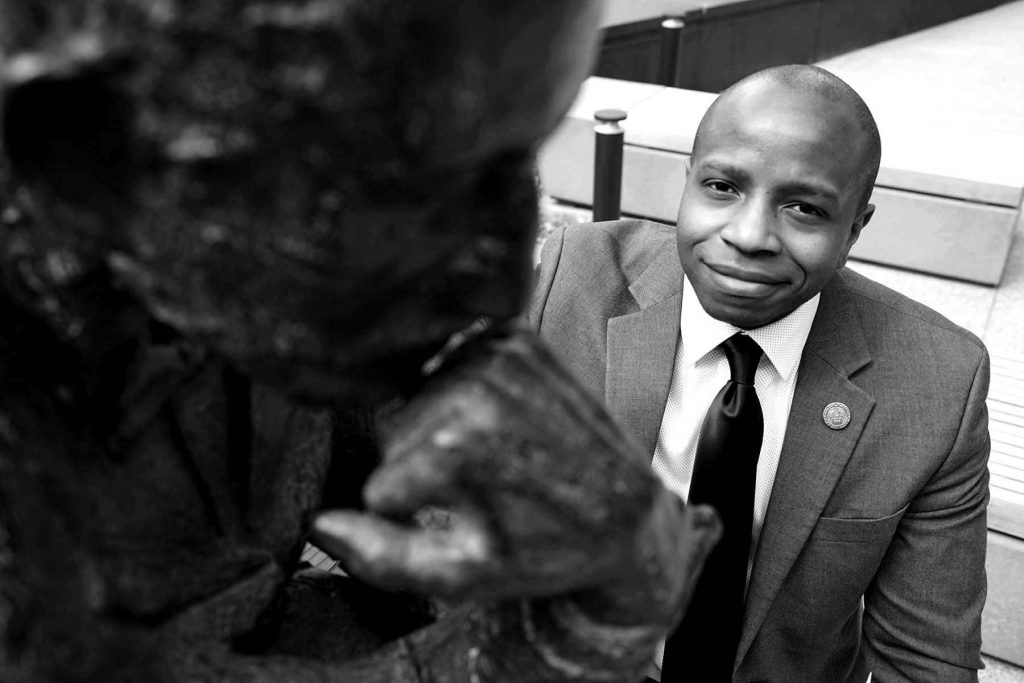
Like any fascists throughout modern history, Donald Trump and the RNC are rolling out a program to try to intimidate minorities and Democratic voters so badly they will leave polling places without voting.
Hugh Jackson wrote about it for the Nevada Current:
“Donald Trump and the Republican National Committee announced a ‘100,000 person strong’ program designed to harass election officials and their employees and discredit democracy in Nevada and a dozen other states. In a statement announcing its Orwellian named ‘election integrity program,’ the RNC said it is ‘establishing a robust network of monitoring, and protection against any violation or fraud.’”
Claiming fraud or proclaiming the illegitimacy of their political opposition is an old, old trick. And now Trump’s RNC is embracing that claim and the other major aspects of fascism with gusto.
But to start at the beginning, Trump kicked off the formal part of his campaign for president back in 2016 by tweeting a famous quote from Benito Mussolini: “It is better to live one day as a lion than 100 years as a sheep.” When Chuck Todd asked him about it on Meet The Press, he said:
“It’s a very good quote, it’s a very interesting quote, and I know it… I know who said it. But what difference does it make whether it’s Mussolini or somebody else?”
People throw around Mussolini’s name (he invented modern-day fascism and coined the word) and point to much of Trump’s behavior and the promises he and other Republicans have made as indicators of a fascist streak in GOP politics. Is it a reasonable analogy? And if Trump fails, are there other wannabe Republican Mussolinis waiting in the wings?
Through most of the 1920s, America had a positive fascination with Italian fascism. Hitler and Franco wouldn’t come to power until 1933, and Tojo didn’t rule Japan until 1941: back in the ’20s we had little idea where the fascist movements would end up.
One of Mussolini’s most famous speeches was 97 years ago, his “Ascension Day” declaration of May 26, 1927, in which he outlined fascism’s true goals.
One of his first points was the need for Italian racial purity. In an earlier speech, he’d pointed to the large number of Italian immigrants in the United States, praising “my fellow citizens who are working to make America great.”
In his Ascension Day speech his embrace of racial eugenics and the use of violence by the state to enforce it was even more blunt:
“It is social hygiene; it is prophylaxis on a national level. These individuals are being removed from circulation just as a doctor quarantines an infected person. But then, who are those people who impute terror to our most humane revolution? It seems people no longer have any idea of what terror truly is. … Whited sepulchers! Sepulchers full of fetid waste! Do not dare speak of ‘terror’ when the Fascist revolution is simply doing its duty: defending itself!”
Speaking to a nearly all-white audience in Minnesota, Trump echoed Mussolini’s admiration for the racial purity of the crowd:
“You have good genes, you know that, right? You have good genes. A lot of it is about the genes, isn’t it, don’t you believe? The racehorse theory. You think we’re so different? You have good genes in Minnesota … Every family in Minnesota needs to know about sleepy Joe Biden’s extreme plan to flood your state with an influx of [Black] refugees from Somalia, from other places all over the planet.”
Mussolini tolerated no opposition either within his Fascist Party or within the government itself. He ultimately outlawed all political opposition, bragging about it in his Ascension Day speech:
“Opposition is not necessary for the functioning of a healthy political regime. Opposition is foolish, superfluous in a totalitarian regime like the Fascist Regime. … Therefore let no one hope that after this discourse anti-Fascist newspapers will be seen. No! Nor that the resurrection of anti-Fascist groups will be allowed. Never!”
Trump has a similar view of political opposition, and has pledged to “go after” Democrats and the media if he gets back into the White House. Saying that Democrats want “to destroy America and to destroy the American Dream,” five months ago, using “vermin,” one of Mussolini’s favorite words, he added:
“[W]e pledge to you that we will root out the communists, Marxists, fascists and the radical left thugs that live like vermin within the confines of our country.”
Mussolini and Trump share a passion for violence as a way of solving political and social problems. Mussolini addressed it in that famous speech:
“I have advocated for violence nearly my entire life; I did so when I was at the head of Italian Socialism, and at that time I struck fear into the sometimes exuberant bellies of my fellow party members, with many warlike forecasts: the ‘bloodbath,’ the ‘historic days.’ I wanted to test the combat effectiveness of this mythical, intangible entity called the Italian proletariat … All the elements are in line: and when they are not, I whip them. Let no one delude himself into thinking that I do not know what is happening in the country, even in the smallest village in Italy. I may find out a little late, but in the end I know about it. And then my sword arrives, just as it recently arrived in one large city, where I distinguished between those Fascists who work and who set a good example, from those who do not know how to set a good example.”
And here in America, being “rooted out” may be the least of the worries of elected Democrats and members of the media if Trump gets reelected. He has long history of embracing violent rhetoric and encouraging violence among his supporters. On January 6th he came right out and told his followers they’d “lose” if they did not “fight like hell” against Congress and Mike Pence to keep him in the White House.
Back in 2020, ABC News identified “54 cases invoking ‘Trump’ in connection with violence, threats, alleged assaults.” The network noted:
“Reviewing police reports and court records, ABC News found that in at least 12 cases perpetrators hailed Trump in the midst or immediate aftermath of physically assaulting innocent victims. In another 18 cases, perpetrators cheered or defended Trump while taunting or threatening others. And in another 10 cases, Trump and his rhetoric were cited in court to explain a defendant’s violent or threatening behavior.”
From lecturing a convention of police, “Please don’t be too nice” to people they’re arresting, to telling his January 6th crowd, “We fight like hell. And if you don’t fight like hell, you’re not going to have a country anymore,” to praising Nazis in Charlottesville after they’d murdered Heather Heyer, calling them “very fine people,” Trump has a long relationship with violent people and violent rhetoric.
Mussolini wanted a single-party state, purged of opposition, supported by the largest corporations in Italy. In his 1935 book The Doctrine of Fascism, he wrote:
“The Fascist State lays claim to rule in the economic field no less than in others; it makes its action felt throughout the length and breadth of the country by means of its corporate, social, and educational institutions, and all the political, economic, and spiritual forces of the nation, organized in their respective associations, circulate within the State.”
In his earlier Ascension Day speech, he was clear about the power of the National Fascist Party:
“We have created the Corporative State. This Corporative State places before us the institutional problem of Parliament … Today, on May 26th, we solemnly bury the lie of universal democratic suffrage … Here we solemnly reaffirm our doctrine concerning the State; here I reaffirm my formula in the speech I delivered at La Scala in Milan: ‘Everything within the State, nothing against the State, nothing outside the State.’”
Trump is pitching a similar vision, supported by the neofascist ideologues behind Project 2025 and Project 47, claiming the Democratic Party is so extreme it’s a threat to America that should be avoided or done away with.
“The Democrats have become too extreme,” Trump told an Iowa rally. “And they’ve become, frankly, too dangerous to govern. They’ve gone wacko.” He added that Democrats are pushing the “politics of anger, division and destruction.” A week later, he explicitly warned about the “radical Democrat mob.”
Finally, like Trump, Mussolini didn’t think women were good for anything more than having sex or producing more white babies to populate his fascist paradise. In his Ascension Day speech, he was unambiguous about Italian women’s obligation to raise the population of the country (then 40 million) by 20 million people by having at least a dozen babies each:
“The unintelligent man says: ‘We are too many.’ Intelligent men reply: ‘We are too few!’ I affirm that the most fundamental if not essential element in the political power and therefore economic and moral power of Nations, is their demographic strength. … Gentlemen, if Italy is to count for anything in the world, then she must reach a population of no less than 60 million inhabitants by the middle of this century.”
In other venues, as documented by his arch-enemy Margaret Sanger, Mussolini was less subtle. She compiled a few of his choice quotes reflecting fascist ideology for Plain Talk magazine in 1937:
“The modern woman is liable to forget the primary duties she owes to civilization, and therefore, I am not in favor of women’s dabbling in politics. Women are unnecessary and unwanted in politics. It will take centuries before they will ever get to understand the political game sufficiently to be a political force of use. In the meantime they are meddling in matters that would be much better left solely in the hands of those who understand them. Women are amusing, sentimental and born romantic. It is the contrary with men. The fair sex are confident, credulous, little animals. Sufficient to them that a man says, ‘I love you’ – they are happy. Women have no wills of their own.”
Donald Trump, while embracing women who suck up to him in public – Marjorie Taylor Greene, Kristi Noem, Lara Trump, and the like, has been far less charitable to them in both his personal life and his political rhetoric.
He cheated on each of his three wives, including trysts with a porn star and a Playboy bunny, and regularly used misogynistic slurs to describe Hillary Clinton when he ran against her in 2016. He bragged about repeatedly sexually assaulting women for decades because, “when you’re a star, they let you do it.”
Mussolini ridiculed menstruation; Trump made frequent reference to “blood” when describing women in media like Mika Brzezinski and Megyn Kelly. He gleefully insulted Carly Fiorina’s appearance, as well as Hillary Clinton and E. Jean Carroll, suggesting none of the three were attractive enough to meet his standards.
And, perhaps most important, he proudly takes credit for selecting Supreme Court nominees who he believed — correctly — would overturn Roe v Wade and put American women, to quote Trump’s “Red Pill” crowd, “back in their place.”
While Trump lacks the intellect, courage, or physical presence of Benito Mussolini, he’s been an eager student of fascism over the past few decades. Most recently, he’s managed to surround himself with people whose rhetoric suggests they’d be open admirers of Il Duce and want for America what he created in Italy.
But he is not the only one. A majority of Republicans (112 of them) in the House of Representatives voted with Russian dictator Putin and against American President Biden on aid for Ukraine; in the Senate, members like Tom Cotton have called for violence against immigrants and a complete cut-off of aid to European democracies in trouble.
And therein lies the existential danger of both a second Trump term and the fascist movement he launched that has taken over the GOP. Only with an overwhelming, multi-state defeat this fall is there a chance that this parasitic, vicious movement may go back underground and remain quiet for another few generations like it did in the decades after World War II.
Yuki Iwamura (AP)
© Thom Hartmann, used with permission. Originally published on The Hartmann Report as How Trump Lit Up a Fascination with Fascism
Subscribe to The Hartmann Report directly and read the latest views about U.S. politics and other fascinating subjects seven days a week.














